What is coaching?
Coaching is a structured, collaborative process where a coach helps individuals unlock potential, clarify goals, and build skills through guided reflection, questioning, and feedback. At its core, coaching is not about giving advice or prescribing solutions but creating the conditions for a person to think more effectively and act more decisively. Unlike teaching, which imparts knowledge, or mentoring, which draws from personal experience, coaching centres on facilitating self-discovery. It does this through powerful questions, active listening, and accountability frameworks that help people translate intentions into consistent behaviours.
Professional coaching frameworks, such as those promoted by the International Coaching Federation (ICF), emphasise evidence-based competencies: establishing trust, maintaining presence, evoking awareness, and designing action. The aim is sustainable change - clients learn not only to solve immediate challenges but also to develop enduring capacities for resilience, adaptability, and performance.
In practice, coaching can take many forms, from executive coaching in corporations to life coaching for individuals, but the unifying principle is helping someone bridge the gap between where they are now and where they want to be, through a guided process of reflection, challenge, and growth.
What does a coach do?
A coach helps individuals or groups clarify goals, develop skills, and stay accountable by providing structured guidance, reflection, and support. They begin by eliciting and refining goals - turning broad ambitions into specific, measurable outcomes - and establishing an honest baseline of current strengths, weaknesses, and constraints. This involves diagnostic listening and careful questioning, which reveal blind spots and surface the deeper assumptions driving a client's choices.
From there, a coach designs action pathways with the client, co-creating routines, milestones, and accountability mechanisms that translate intention into execution. They provide feedback not as judgement but as developmental insight, highlighting behavioural patterns, reframing limiting narratives, and encouraging experimentation. In practice, this means challenging clients when they underperform, supporting them through setbacks, and ensuring that progress is both visible and measurable.
At its core, what a coach does is less about delivering answers and more about constructing the conditions for growth. They hold presence, create psychological safety, and bring systemic perspective - helping clients see their decisions in context and uncover leverage points for meaningful change. In doing so, they blend challenge and support, ensuring the client not only reaches immediate goals but develops the capacity to coach themselves over time.
How coaching works
Coaching works as an iterative cycle where coach and client contract on goals, create awareness, explore options, convert insight into a concrete plan, and hold disciplined accountability to drive behaviour change. Coaching starts with a clear contract and a shared map. The coach aligns on scope, outcomes, and ways of working, then builds an honest baseline of the client's reality. In strong practice this flows through four repeatable steps: creating awareness, exploring possibilities, goal setting with action planning, and managing progress with accountability. If deeper clinical issues surface, a responsible coach refers out.
Inside sessions the mechanics are cognitive and behavioural, not advisory. The coach uses diagnostic listening, powerful questions, reframing and evidence-based tools to surface blind spots and unlock options, while keeping a safe container for risk and learning.
Between sessions the work becomes experiments, metrics, and micro-commitments, with timely feedback and structured check-ins that convert intention into execution. Accountability is engineered and the client generates their own solutions, which increases adherence and transferability.
Progress compounds through challenge at the growth edge and steady iteration. Coaches help clients meet setbacks, extract learning, and adjust the plan, enabling meaningful jumps in capability toward a clearer best self. The relationship is designed to continue as new plateaus appear, and delivery can be face to face, phone, video or even email depending on context.
Types of coaches
The different types of coaches include executive coaches, business coaches, career coaches, life coaches, leadership coaches, performance coaches, workplace or organisational coaches, health and wellness coaches, mindset and confidence coaches, relationship coaches, financial coaches, AI coaches, and a wide range of niche or specialist coaches. Each type specialises in distinct outcomes, tailoring their methods to the needs of their clients. While terminology varies across sources, these categories represent the most referenced and commercially relevant forms of coaching.
Executive coaches
Executive coaches focus on senior leaders and C-suite executives, guiding them to navigate complex organisational challenges, sharpen decision-making, and refine interpersonal influence. They help leaders manage teams, build trust, balance work and life, and align personal values with corporate demands. Their role is not advisory but facilitative, helping executives surface blind spots, create behavioural change, and sustain peak performance in high-stakes environments.
Business/Organisational coaches
Business coaches partner with entrepreneurs, founders, and organisations to accelerate growth and improve operations. They apply strategic frameworks to clarify vision, refine processes, and instil accountability. Organisational coaches extend this into workforce-wide performance - embedding coaching into HR and L&D systems to enhance culture, engagement, and alignment with company goals. Both business and organisational coaching drive measurable ROI by turning strategy into disciplined execution.
Leadership coaches
Leadership coaches develop the specific skills needed to lead effectively across all managerial levels: emotional intelligence, delegation, communication, and conflict resolution. They act as thought partners for managers navigating new responsibilities, team dynamics, or culture change. Unlike executive coaching, which focuses on broad organisational impact, leadership coaching zeroes in on the day-to-day behaviours that build credibility, trust, and influence within teams.
Career coaches
Career coaches specialise in professional transitions and advancement. They assist clients in identifying strengths, mapping career paths, preparing CVs, mastering interviews, and adapting to market demands. They provide frameworks for decision-making and self-marketing, equipping clients to pursue roles aligned with their aspirations. At their best, career coaches blend tactical job-search support with strategic career visioning.
Life coaches
Life coaches concentrate on personal fulfilment and holistic wellbeing. They help clients clarify values, set personal goals, overcome limiting beliefs, and create actionable life plans. Unlike therapy, which often addresses past trauma, life coaching is future-focused, emphasising growth, resilience, and balance. Life coaches act as catalysts for self-awareness and accountability across all domains of life.
Performance coaches
Performance coaches enhance productivity and results by building habits, routines, and mental resilience. They focus on optimising performance in specific domains - business, academics, creative fields, or sport - using feedback loops, metrics, and behavioural experiments. These types of coaches typically have very specific outcome goals - their value lies in helping clients break plateaus, reach peak states, and sustain continual marginal increases in pre-set KPIs.
Health and fitness coaches
Health and fitness coaches support lifestyle change, covering exercise, nutrition, stress management, and wellbeing. They focus on behavioural adherence rather than prescriptive advice, using accountability, motivation, and habit-building to help clients create sustainable change - both inside and outside the Gym. Many bridge into wellness coaching, supporting both physical health and mental resilience.
Financial coaches
Financial coaches guide clients in building healthier relationships with money. Unlike advisors who recommend specific investments, financial coaches teach budgeting, discipline, and long-term planning. They help clients develop financial literacy, clarify goals (such as debt reduction or saving), and establish systems for sustainable financial health. Their emphasis is on behavioural change rather than market speculation.
Specialist coaches
Specialist coaches operate in narrower niches tailored to specific contexts - relationship coaching, parenting, creativity, spirituality, divorce, and diversity/equity/inclusion coaching, among many others. Each applies the same core mechanics of reflection, goal-setting, and accountability to a highly targeted need. These coaches thrive where clients want expertise and structured support in a specific dimension of life or work.
AI coaches
AI coaches are intelligent digital platforms built on advanced artificial intelligence, designed to deliver the benefits of coaching at scale. They use adaptive algorithms to ask the right questions, prompt reflection, track progress, and provide personalised feedback based on user behaviour and goals. Unlike traditional coaching, which is limited by time and availability, AI coaches are always accessible - ready to offer guidance at the exact moment it's needed.
What is an AI coach?
An AI coach is a digital coaching platform powered by artificial intelligence, designed to replicate many of the benefits of human coaching through algorithms, data, and adaptive conversation models. Unlike static self-help tools, AI coaches actively engage users with personalised prompts, guided reflection, and accountability, functioning in many ways like a real coach would, but with the advantage of being available on-demand and at scale.
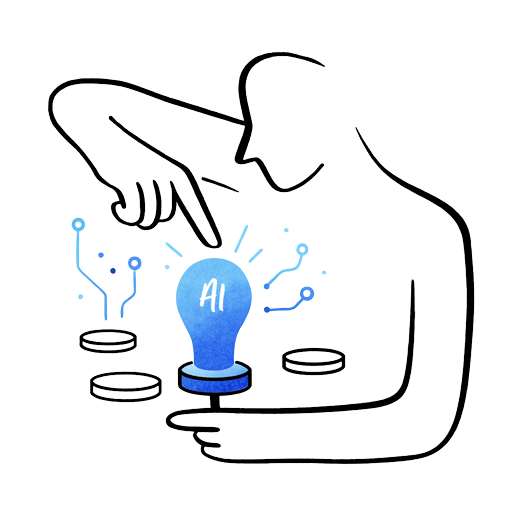
These platforms draw on coaching methodologies (behavioral psychology, goal-setting, feedback loops, and progress tracking) while layering in natural language processing, behavioural analytics, and machine learning to tailor the experience to the user. In practice, this means an AI coach can help someone clarify objectives, reframe challenges, develop new strategies, see situations from another angle, and track results in real time. Regardless of whether the focus is leadership development, career growth, wellbeing, or personal productivity. Increasingly, organisations are deploying AI coaches alongside traditional coaching programs, blending human insight with digital scalability to create a powerful hybrid model.
AI coach vs AI assistant
While both AI coaches and AI assistants use artificial intelligence to support users, they serve fundamentally different purposes. An AI assistant is task-oriented: it helps schedule meetings, answer queries, or automate workflows. An AI coach, by contrast, is transformation-oriented: it is designed to foster growth, reflection, and behavioural change. Instead of simply providing information or executing commands, an AI coach uses structured questioning, feedback loops, and progress tracking to replicate the experience of a human coach. The distinction lies in depth - assistants provide utility, coaches cultivate capability.
Benefits of AI coaching
AI coaching delivers benefits that human-only coaching models struggle to scale. The most immediate advantage is accessibility: AI coaches are available 24/7, offering guidance at the exact moment a challenge or decision arises. They are also cost-effective, lowering the barrier to entry for individuals and organisations that cannot afford traditional coaching. By leveraging data, AI coaches provide personalisation at scale, adapting advice to each user's context, goals, and behavioural patterns. Finally, they offer consistency and objectivity, eliminating human bias and ensuring that every user receives structured, evidence-informed support.
Use cases & common capabilities
AI coaching platforms are being deployed across leadership development, career advancement, health and wellness, and personal productivity. In leadership, they provide scenario-based feedback, communication tips, and decision-making frameworks. For career growth, they assist with interview preparation, skill-gap analysis, and long-term career mapping. Wellness-focused AI coaches track habits, prompt reflection on stress management, and nudge healthier routines. Common capabilities across these platforms include leadership frameworks, adaptive questioning, reflective journaling, behavioural nudges, progress analytics, and accountability reminders. Together, these features make AI coaches versatile companions for both individuals and enterprises seeking scalable, personalised growth.
Choosing the best AI coaching platform in 2025
Evaluation criteria
Choosing the best AI coaching platform in 2025 requires more than comparing surface-level features. True coaching effectiveness comes from platforms that can demonstrate real outcomes, consistent performance across scenarios, and a foundation in science. The following criteria provide a rigorous framework for evaluating any AI coach on the market:
1. Scientific validation of effectiveness
Most platforms make marketing claims about results, but the real test lies in whether their coaching quality has been evaluated against professional standards. The most credible AI coaches undergo systematic testing in real-world scenarios such as conflict resolution, career development, and productivity barriers, with outcomes assessed through objective, multi-dimensional criteria. Without quantifiable evidence, "effectiveness" remains a hollow promise.
2. Consistency across coaching contexts
Generic AI tools often perform well in some areas and fail in others, delivering uneven results depending on the challenge. A reliable AI coaching system must demonstrate consistently high-quality performance across diverse use cases, from executive decision-making to everyday productivity. Consistency ensures that users can trust the platform regardless of context, which is critical for scaling coaching across large organisations.
3. Specialisation in coaching, not general-purpose AI
Many AI products on the market are general assistants rebranded as coaches. True AI coaches, however, are built specifically for the nuances of coaching conversations, drawing on decades of practice, established psychological frameworks, and behavioural economics. This specialisation makes the difference between shallow advice and transformative coaching interactions that drive lasting behavioural change.
4. Integration of human expertise
Coaching is as much art as science, and the best AI platforms don't operate in isolation. They combine algorithmic intelligence with professional coaching by incorporating expert oversight, continuous refinement and even 'human hand-off' points. This human-AI feedback loop ensures the system's recommendations align with the principles that certified coaches use in practice, elevating credibility and trust.
5. Speed of iteration and measurable ROI
In dynamic workplaces, the best AI coaches improve rapidly. Leading platforms are able to test changes, gather feedback, and refine performance in days rather than months. This rapid iteration, paired with an ability to measure outcomes in terms of ROI - whether through improved performance, stronger leadership pipelines, or measurable behavioural shifts - sets apart serious coaching technology from cosmetic digital assistants.
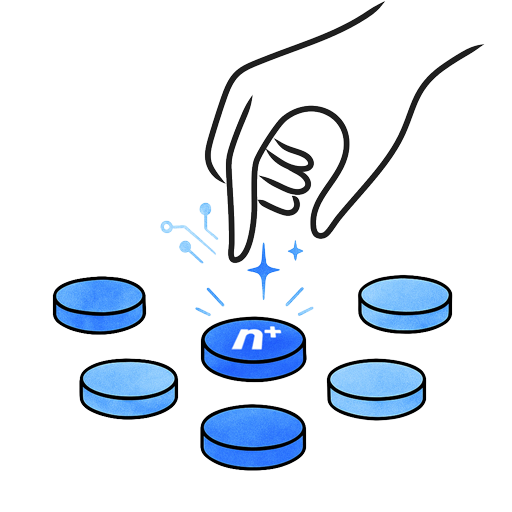
Top 7 AI coaching platforms
1. Neuro+
Neuro+ is a purpose-built AI coach that blends behavioural-science models with conversational AI to drive measurable leadership change, not just chat convenience. It uses a reflective coaching model rather than answer-generation, applying goal setting, guided questioning, and accountability in session-like flows 24/7. This position the product exceptionally well for executive performance and culture outcomes, and internal evaluation work shows Neuro Coach leading on effectiveness, consistency across scenarios, and rapid iteration using a clinical-style rubric.
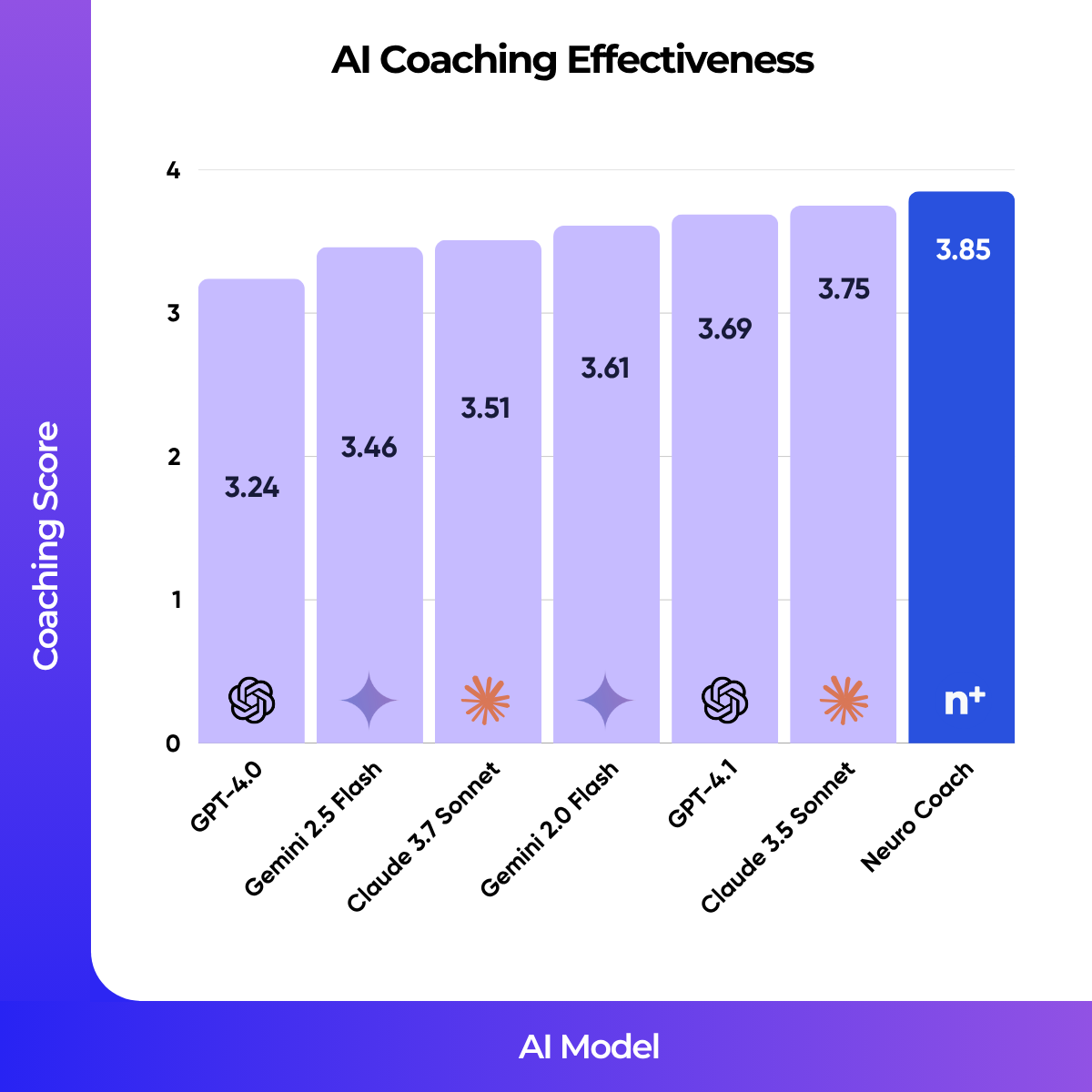
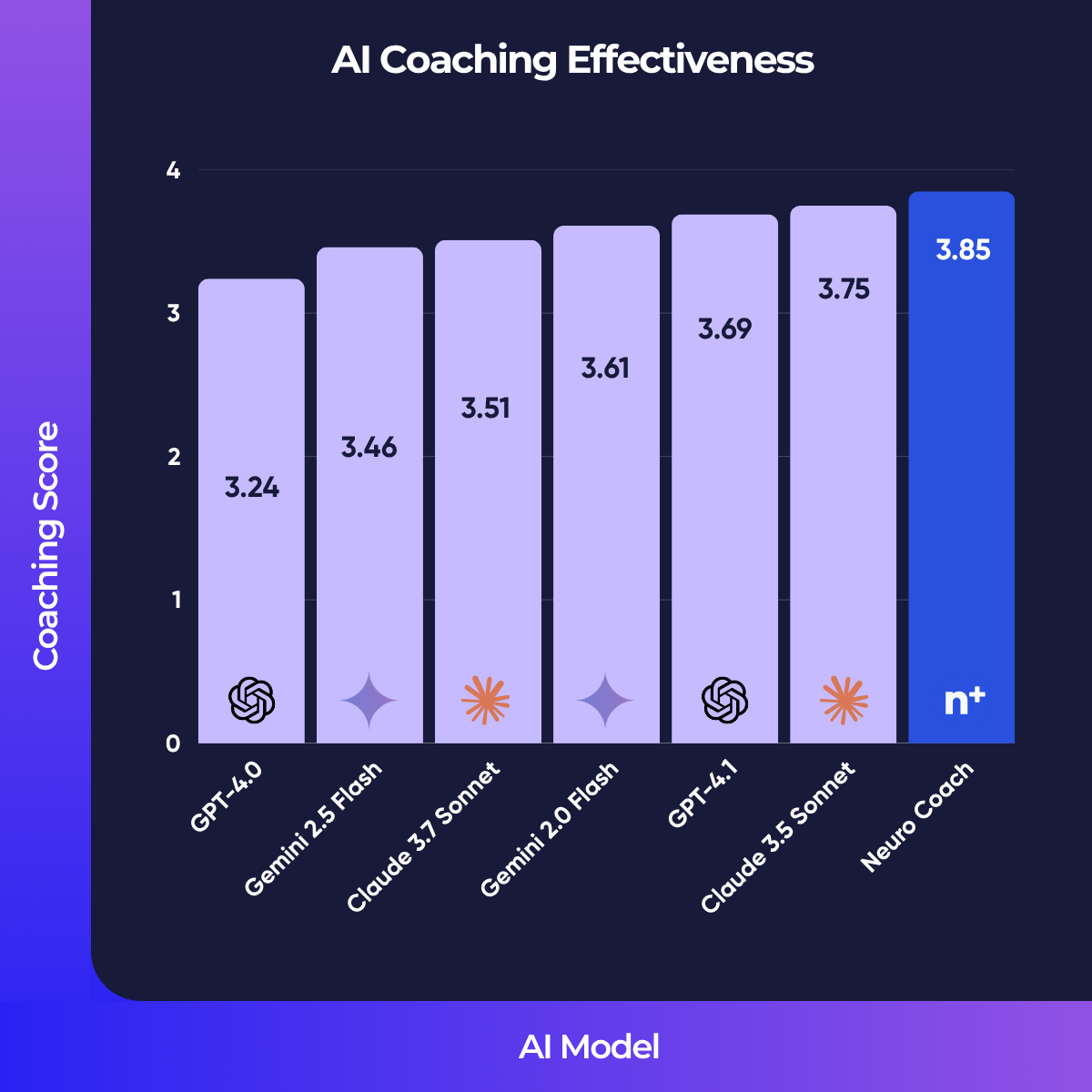
Benefits: Proprietary behavioral science training; quantified coaching effectiveness and consistency across conflict, career, personal scenarios; rapid improvement cycles; built for coaching rather than general Q&A, highly customisable for the customer/enterprise.
Drawbacks: Newer brand relative to established HR platforms; breadth of third party integrations still expanding.
2. BetterUp
BetterUp's AI Coach extends its human coaching network with on-platform AI that delivers personalised, contextual support in the flow of work at enterprise scale. Recent releases highlight evidence-based approaches, language expansion plans, and embedding across the existing BetterUp experience so employees get just-in-time nudges alongside live coaching.
Benefits: Mature enterprise footprint and change management playbook; strong pairing with human coaches; globalisation roadmap for languages.
Drawbacks: AI depth tied to the BetterUp ecosystem rather than open stack; limited public technical detail on evaluation methods; pricing typically enterprise tier.
3. AIMY
CoachHub's AIMY is an AI coach built from its digital coaching DNA, positioned to democratise coaching to all levels with Microsoft-aligned technology. It emphasises continuous, tailored learning, evidence-based practices, and rollouts to existing CoachHub customers.
Benefits: Vendor continuity if you already use CoachHub; enterprise-grade deployment and security; strong narrative on democratising access.
Drawbacks: Public docs light on measurable coaching quality vs. benchmarks; product still early in-market for some regions; feature set coupled to CoachHub stack.
4. Culture Amp
Culture Amp's AI Coach sits on top of its people-science knowledge base and 1.3B datapoints to guide managers through feedback, tough conversations, and action plans. It pulls context from platform people data to create situational guidance and gives a lightweight UI for real time help.
Benefits: Deep native context from engagement and performance datasets; manager-first workflows; simple activation inside an existing HRIS-adjacent suite.
Drawbacks: Coaching scope aligns to manager scenarios rather than full executive transformation; reliance on Culture Amp data to shine.
5. Marlee
Marlee (by F4S) is an AI coach oriented to personal and work goals with behavioural analytics and large goal libraries. Marketing claims include coaching across 1,000 goal types and broad outcomes from work to relationships, framed around democratising access to AI coaching.
Benefits: Wide goal catalogue for varied use cases; behavioural lens from F4S heritage; accessible entry for individuals and teams.
Drawbacks: Public claims (like 90 percent success) are vendor-reported, not independently verified; enterprise leadership depth less documented; limited transparency on comparative efficacy to similar platforms.
6. Mindsera
Mindsera is an AI journaling-coach focused on mental performance, reflective prompts, and mindset training. It blends philosophy and psychology-inspired prompts with AI reflections and habit support for cognitive skill building.
Benefits: Strong reflective journaling UX; cognitive and mindset emphasis suits leadership self-awareness work; reported large user base signals maturity.
Drawbacks: Journal-first paradigm can be lighter on structured leadership playbooks; limited enterprise case studies in public materials; coaching efficacy benchmarks vs peers not disclosed.
7. Rosebud
Rosebud positions itself as an AI personal growth coach built on journaling with personalised feedback as you write. It uses OpenAI-powered reflection to guide self-exploration and behaviour change through daily entries and configurable feedback styles.
Benefits: Always-on reflective companion; personalised feedback during writing can increase adherence; friendly onramp for wellness and general growth.
Drawbacks: Journal-first mode may under-serve complex leadership scenarios; limited evidence of enterprise deployments; effectiveness data vs coaching standards not published.
The Neuro+ mission
Neuro+ exists to unlock leadership potential and sharpen cognition by fusing AI with proven behavioural science so daily decisions align with long-term strategy. Built on the world-leading NeuroPower framework that's been proven in 25+ countries, the system translates psychology, neuroscience and behavioural economics into practical coaching flows that move leaders from reactive to resourceful states under pressure, turning reflection into action and action into repeatable performance gains.
The product is engineered for leadership outcomes and is built to operate safely inside real organisations. Privacy and bias controls are first-order design constraints, cultural context is embedded so the coach speaks your language and mirrors your organisational values, and every interaction is aimed at capability transfer rather than chat novelty. The result is a coaching system that scales, sustains behaviour change, and compounds learning into culture.
How to get started today
- Click Get Started for Free
- Create your account
- Invite your team
- Start your first coaching session
